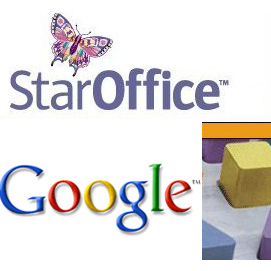Pelo menos por enquanto... Este post é uma sequência da questão, que tentou acompanhar ontem (ter, 04/out) o barulho do anúncio da parceria Google + Sun. David Berlind, da ZDNet, mandou bem:
...the one wild card that sticks out in my mind as the most exciting possibility is the one where Google finally takes that laggard desktop Java and does something big with it. Think about it. The ecosystem around server side Java — known as "big Java" inside Sun but Java EE (Enterprise Edition) everywhere else – is thriving. So much so that the open source crowd has crashed the party (a real sign that you've got something useful to a lot of people). The ecosystem around mobile Java — otherwise known as J2ME — is doing quite well too. There's probably a gazillion phones out there with Java on them and all sorts of handset-oriented apps now finally taking advantage of that platform's pervasiveness. But then there's desktop Java. Always sort of hanging around in the background occasionally getting used, but with no real killer application that has sent it into the stratosphere.
Although Sun would probably dispute this (after all, the deal has Google leveraging Sun's distribution of Java, not the other way around), desktop Java has long needed a sugar daddy. And, as one of the few companies with the reach, the resolve (to disrupt the status quo), the cash, the Java expertise (Adam Bosworth, anyone?), and various desktop application implementations that fall an imperceptible sliver short of where desktop Java can start to take them, Google is the hottest prospect to come desktop Java's way in a long time. Maybe forever. With Outlook Web Access (OWA), Microsoft may have been the first to take Asynchronous Javascript and XML (AJAX) mainstream. But, in a variety of applications from email to maps, Google has been the one to not only perfect it, but to also turn it against Microsoft. Now, all Google must do is give the "J" in "AJAX" the dual personality that Microsoft would have never given it, and there's very little if anything that Google and Sun won't be able to deliver to our destkops that, until today, required a significant amount of local resources (processor, hard drive, memory, etc.). Required resources by the way that are going up in the next wave of the fat client's cartel's alternative, not down.
The implications are many once Google extends the J in AJAX to equal "Java" as well as "Javascript." Given the portability of Java code between the server, desktop, and mobile editions of that platform, one can only guess at the plethora of Salesforce.com-esque applications that Google will deliver on a nearly equal footing to all devices (desktops, kiosks, handsets, etc.). This has long been a part of Sun's dream for Java. Sure, there are challenges to mirroring the functionality of a desktop application on a handset. But, if anyone can master that challenge, Google can. And you can also leave it to Google to make its apps irresistable based on the value it will add to your data and presence in Google's online cloud.
Naysayers will haul out the portability card and talk about how lack of connectivity from every corner of the Earth means cloud-based computing won't be a reality any time soon. This is FUD. The funny thing is that I just realized how a goodly 95 percent of the computing I do — authoring blogs (aka: creating documents), checking e-mail, browsing the Web, chatting, uploading photos, and VoIP — is all cloud-based.
...
The entire fat client cartel (not just Intel and Microsoft) should be concerned. Worried? No. Concerned? Yes. Not because they couldn't respond technically with architectures and implementations in kind. But because they can't seem to find it themselves to break with their pasts.
...
Much to the chagrin of .NET, the net result should the various network operators become the go to market channel for Google and Sun's partnership could be a huge boost for Java as well as any other agendas that any company with its sights set on Microsoft wouldn't mind shoving through that channel (like the OpenDocument Format). What could be worse for Microsoft than a pair of committed competitors with the resources to cut Windows, Office, and .NET down at the knees (Bear in mind that resources are one thing. Execution is another.)
=============
pv: Vc vai esperar pra ver? Sei não, acho q eu não vou não...
 ;
;

























